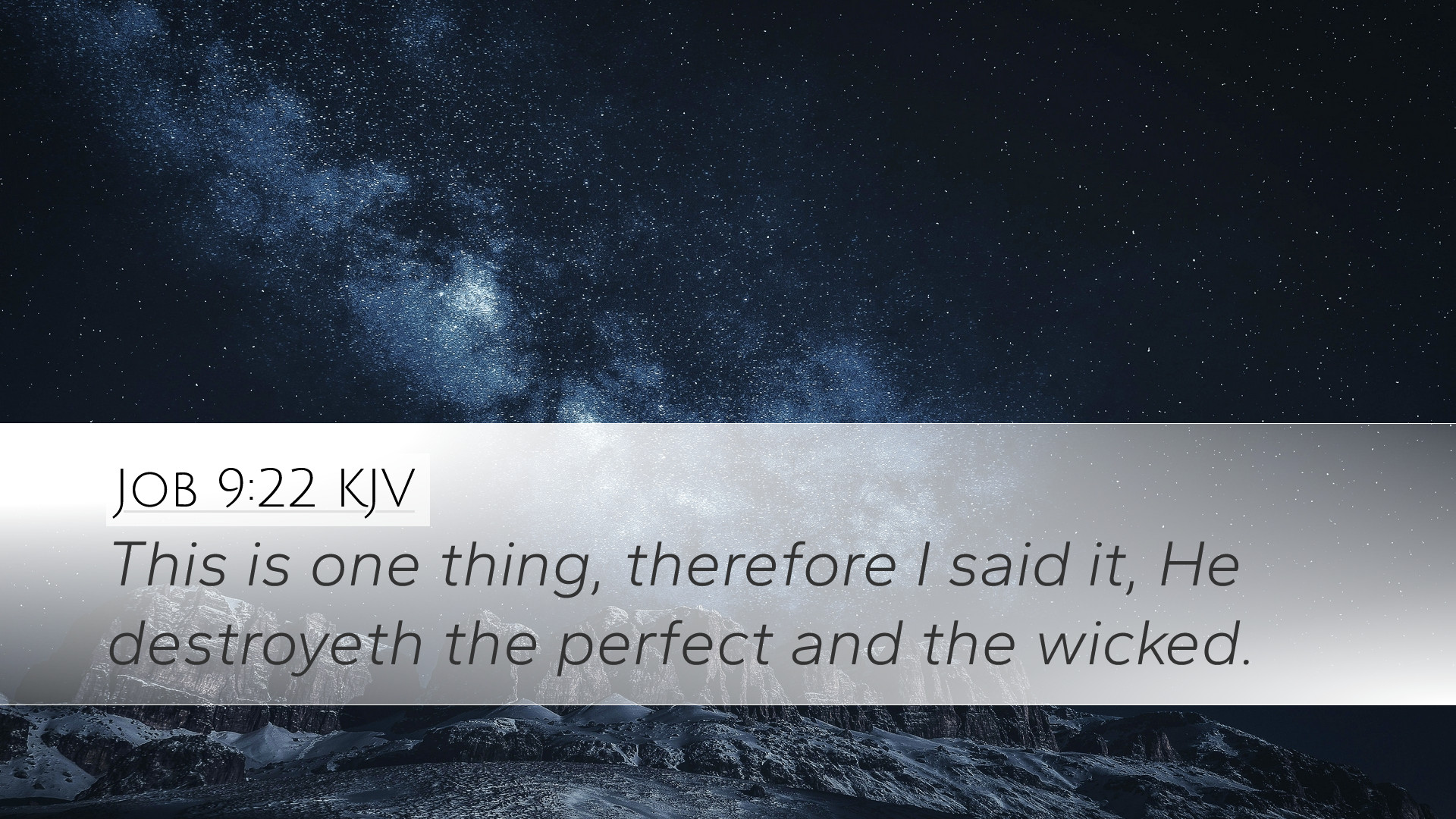Commentary on Job 9:22
Job 9:22 states: "It is all one; therefore I say, He destroyeth the perfect and the wicked." This verse captures a profound theological and existential dilemma faced by Job as he navigates his suffering and grapples with the nature of God and justice.
Introduction to the Context
The book of Job is a profound exploration of suffering, faith, and the sovereignty of God. As Job laments his condition and seeks to understand his afflictions, he raises critical questions regarding divine justice and human righteousness. This particular verse falls within Job’s defense against his friends’ assumptions that suffering is a direct result of personal sin.
Thematic Insights
Job 9:22 can be understood as a summary of Job's despair regarding the apparent indiscriminate nature of God's justice. Here are several insights derived from various commentators:
-
Matthew Henry:
Henry emphasizes the futility of human reasoning when confronted with divine sovereignty. He posits that Job's declaration reflects the belief that both the wicked and the righteous meet the same fate, suggesting a challenge to the understanding of retributive justice. This idea raises questions about God’s governance of the world.
-
Albert Barnes:
Barnes interprets this verse as an expression of Job's disillusionment with the perceived randomness of suffering. He notes that Job feels that God’s dealings with humanity do not align with human expectations of justice. Barnes suggests that this radical insight places Job in a broader theological conversation about the nature of God—specifically, a God who reigns with wisdom and sovereignty beyond human comprehension.
-
Adam Clarke:
Clarke expands on the philosophical dilemma inherent in Job's statement. He articulates the paradox of suffering and divine justice, indicating that Job struggles with the eradication of distinctions between the moral conduct of individuals when faced with calamity. Clarke posits that this verse reflects a deep psychological anguish, coming from a recognition of the universal nature of human suffering.
Theological Implications
At the heart of Job 9:22 lies complex theological inquiry about the justice of God:
-
Divine Justice:
Job’s assertion challenges conventional wisdom regarding divine retribution and the distribution of suffering. The implication is that God's ways are inscrutable, and His governance transcends human understanding.
-
Suffering and Righteousness:
The verse invites reflection on the nature of suffering among the righteous. It foregrounds the reality that suffering is not always indicative of divine disfavor, thus providing a counter-narrative to the simplistic moral interpretations of suffering.
-
The Character of God:
Job's lament brings to the forefront attributes of God such as His omnipotence and the complexity of His will. It questions the accessibility of God’s justice and whether it can be systematically interpreted by humans.
Pastoral Reflections
For pastors and those in ministry, this verse holds significant relevance:
-
Empathy in Ministry:
Understanding Job's struggle enables better pastoral care for those in suffering. It provides a framework for empathizing with individuals who feel abandoned or perplexed by their circumstances.
-
Teaching on Divine Sovereignty:
This passage serves as a powerful opportunity to teach about the nature of God, inviting congregations to trust in His ultimate wisdom rather than human reasoning.
-
Encouraging Hope:
Despite the grim acknowledgment of suffering's universality, the book of Job ultimately points toward hope and restoration, emphasizing that suffering is not the end of the story.
Conclusion
Job 9:22 encapsulates a response to the troubling questions surrounding God’s justice and suffering. Combined with insights from classical commentaries, it urges readers to engage deeply with their understanding of divine sovereignty. The lessons derived from this verse encourage believers to embrace the complexity of faith amidst suffering, fostering a more nuanced understanding of God’s nature, justice, and the human experience.


